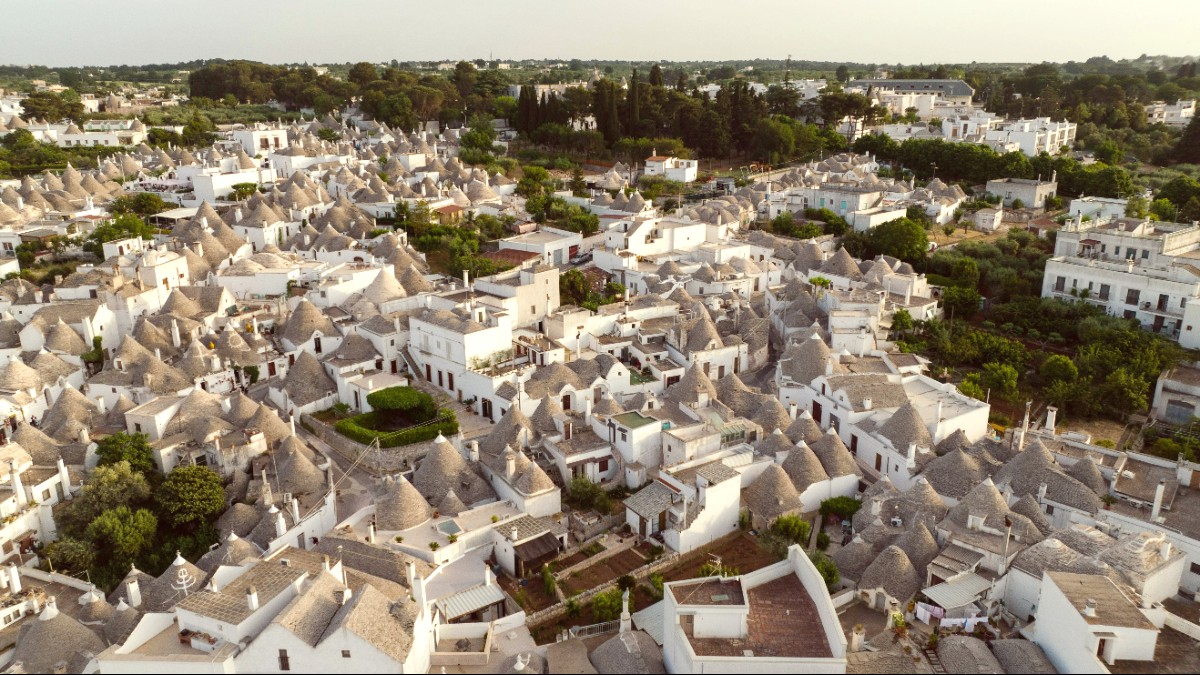
Puglia, Italy
Puglian cuisine, known as Cucina pugliese, highlights simplicity and flavor. It often follows Cucina povera (poor cuisine), using readily available, seasonal ingredients from the land and sea. This approach mirrors the region's agricultural roots and history of resourceful cooking.
Puglia earns the title "breadbasket of Italy" and "olive oil capital." Its cuisine historically comes from the fertile land: grains, vegetables, and olives. The region’s long coastline also contributes fresh seafood, though Alberobello, being inland, focuses more on land-based dishes. Simple cooking methods allow the ingredients' quality to shine, a signature of Puglian cooking.
Puglia is Italy's largest producer of olive oil. Extra virgin olive oil forms the base of nearly every dish, delivering a rich, fruity taste.
Vegetables form a part of the Puglian diet, including fava beans, chicory, wild greens, tomatoes, artichokes, eggplants, and bell peppers. Durum wheat is common, used for rustic breads like pane di Altamura and pasta, most notably orecchiette.
Puglia is known for fresh cheeses like burrata, mozzarella, ricotta, and caciocavallo. Lentils, chickpeas, and broad beans appear in hearty soups and stews. Lamb and pork are common meats.
"Little ear" shaped pasta served with sautéed turnip greens, garlic, chili, and often anchovies. A very iconic Puglian dish.
Find this in almost any traditional trattoria.
A thick, soft, and airy flatbread, topped with cherry tomatoes, olives, and olive oil. Perfect for a quick snack.
Enjoy fresh from bakeries (panifici).
A fresh Italian cheese, similar to mozzarella but with a richer, creamier interior. Best eaten simply with local olive oil.
A local specialty.
Puglia is a significant wine-producing region. Look for robust reds like Primitivo (Zinfandel), Negroamaro, and Salice Salentino. Local white grapes include Verdeca and Bianco d'Alessano.
Taralli are small, savory, ring-shaped crackers, common throughout Puglia, with flavors like olive oil or fennel. For sweets, try Pasticciotto (custard-filled pastry) or Cartellate (fried pastries drizzled with vincotto).
Alberobello itself holds a limited number of truly fine dining establishments in the Michelin-star sense. However, several quality trattorias and Ristoranti offer refined versions of traditional Puglian dishes, focusing on high-quality ingredients and presentation.
Numerous trattorias and osterias exist within the trulli zone (Rione Monti) and the modern town center, providing authentic Puglian cuisine in a comfortable setting. These are excellent places to try signature dishes.
For budget-friendly and delicious options, explore local panifici (bakeries) for fresh focaccia, panzerotti, or various types of bread. Pizzerias cater to local residents for classic Italian pizza.
Puglia's cuisine is vegetable-rich, making vegetarian choices relatively easy. Dishes like purea di fave e cicorie, focaccia, various vegetable-based antipasti, and orecchiette con verdure are common.
Vegan options call for more careful inquiry, as many dishes use cheese or olive oil. Confirm dairy-free and meat-free status.
Awareness of gluten-free (senza glutine) options is growing. Some restaurants may offer gluten-free pasta or pizza. Communicate your dietary needs clearly.
Print out cards with Italian translations of your allergies (e.g., "Sono celiaco/a" - I am celiac; "Sono allergico/an a..." - I am allergic to...).
Hands-on Puglian cooking classes, often focusing on traditional pasta like orecchiette or focaccia. These typically occur in a traditional trullo setting, offering an immersive way to learn.
Walking food tours in Alberobello and surrounding towns often lead to local markets, bakeries, and eateries, offering tastings of various specialties with cultural context.
Many masserie (farmhouses) offer direct experiences, including learning about olive oil production and sampling different varieties of Puglia's extra virgin olive oil.
Some farms feature demonstrations of how fresh cheeses like mozzarella or burrata are made.
Always communicate your dietary needs clearly to restaurant staff. Print out cards with Italian translations of your allergies.
Example phrases: "Sono allergico/an a..." (I am allergic to...), "Senza noci" (without nuts).
While staff may be accommodating, understanding of less common allergies might be limited in very traditional, small eateries.
Be specific about cross-contamination concerns if relevant.
Many restaurants in the Rione Monti and Aia Piccola districts feature trulli as charming dining spaces, creating an atmospheric meal within the iconic architecture.
Beyond formal classes, some local B&B hosts may offer informal cooking demonstrations or even share recipes, enhancing your cultural immersion.
Explore local vineyards, gain insight into the winemaking process, and enjoy tastings of regional wines like Primitivo and Negroamaro.
Some specialized classes focus on traditional Puglian sweets like Pasticciotto or Cartellate, letting you master their preparation.
While Alberobello is inland, coastal towns nearby offer fresh seafood cooking classes or market tours focused on marine ingredients.
Every dish tells a story of Puglia's agricultural heritage and its people's connection to the fertile land and local produce.
From ancient olive groves to durum wheat fields, the ingredients speak of tradition.
The simplicity of Puglian cooking accentuates the quality of the ingredients, a reflection of the passion and skill passed down through generations.
Local chefs and home cooks take pride in their culinary legacy.
Choosing smaller, family-run restaurants and farm stays contributes directly to the local economy and supports traditional practices.
Do not hesitate to ask restaurant staff or your hosts about the origin of ingredients or specific cooking methods for a appreciation.
From market stalls to beautifully presented dishes, Puglian cuisine offers many photographic opportunities.
While most dining experiences are welcoming, a little Italian goes a long way. Basic phrases can enhance your interactions and clarify any dietary needs.